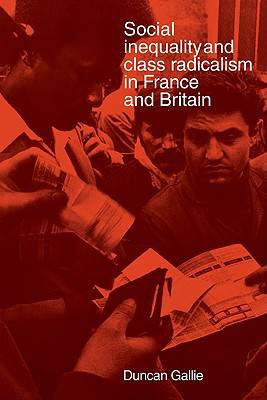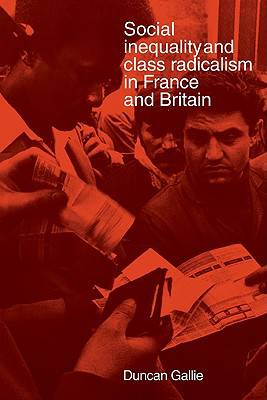
Bedankt voor het vertrouwen het afgelopen jaar! Om jou te bedanken bieden we GRATIS verzending (in België) aan op alles gedurende de hele maand januari.
- Afhalen na 1 uur in een winkel met voorraad
- In januari gratis thuislevering in België
- Ruim aanbod met 7 miljoen producten
Bedankt voor het vertrouwen het afgelopen jaar! Om jou te bedanken bieden we GRATIS verzending (in België) aan op alles gedurende de hele maand januari.
- Afhalen na 1 uur in een winkel met voorraad
- In januari gratis thuislevering in België
- Ruim aanbod met 7 miljoen producten
Zoeken
€ 72,45
+ 144 punten
Omschrijving
This book, first published in 1983, examines in depth the nature and sources of class radicalism in France and Britain and takes issue with some of the major theories of class consciousness and class action. Drawing on data both from detailed case studies and from wider national surveys, it shows that the conflict of class interests within capitalist societies can lead to sharply diverging attitudes to class inequality. It argues that the explanation of such differences cannot be found in some 'general' law of the evolution of social conflict in capitalist society. It must be sought in the profound institutional differences that exist between the two societies. In particular the study argues for a reassessment of the importance of the experience of war and of the way in which the business and political elite handled the social crises generated by war, in accounting for the long-term structural divergence of capitalist societies.
Specificaties
Betrokkenen
- Auteur(s):
- Uitgeverij:
Inhoud
- Aantal bladzijden:
- 352
- Taal:
- Engels
Eigenschappen
- Productcode (EAN):
- 9780521277006
- Verschijningsdatum:
- 26/01/1984
- Uitvoering:
- Paperback
- Formaat:
- Trade paperback (VS)
- Afmetingen:
- 152 mm x 229 mm
- Gewicht:
- 517 g

Alleen bij Standaard Boekhandel
+ 144 punten op je klantenkaart van Standaard Boekhandel
Beoordelingen
We publiceren alleen reviews die voldoen aan de voorwaarden voor reviews. Bekijk onze voorwaarden voor reviews.









